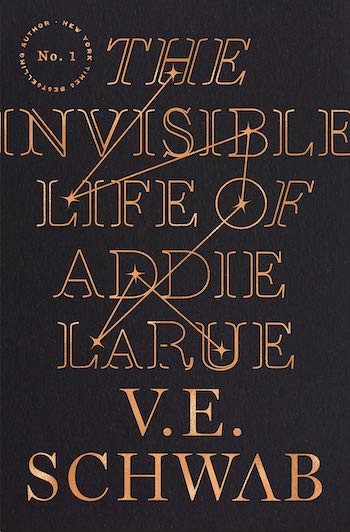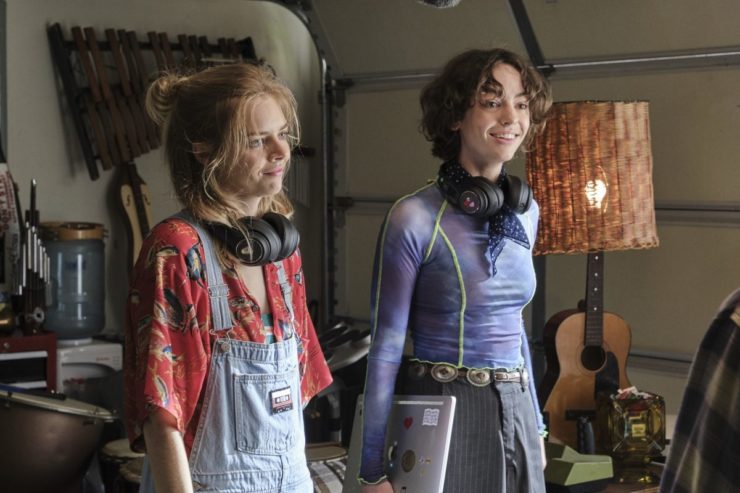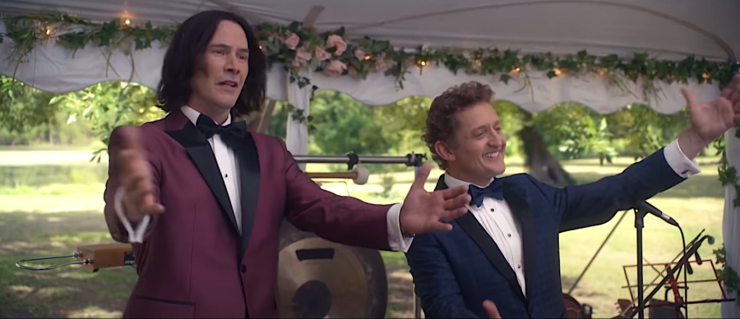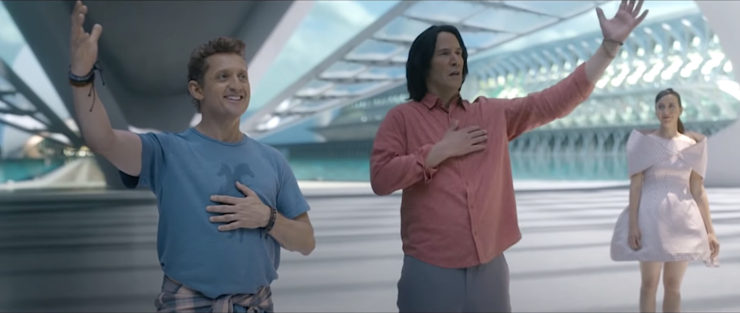If you haven’t watched Bill and Ted Face the Music yet I recommend that you do so. In fact, if you haven’t watched any of the Bill and Ted movies in a while, I suggest you watch all three. Bill and Ted Face the Music is such a pure shot of joy, and such an epic reply to our current moment, that I think it might be exactly what this timeline needed right now.
It’s also—this is going to be hard to describe, but you know how Bill and Ted loved the pure shredding of a particular type of metal? Well, there are parts of this movie that evoke nothing so much as an especially bitter song by The National, in a most excellent way. There is a point about three quarters of the way into the movie, where the writers and Alex Winter and Keanu Reeves choose to take a scene completely seriously that is, honestly, one of the best reckonings with aging and regret that I’ve seen in a film in years. After all the reboots and genderswaps and re-imaginings, B&T FTM is one of the best returns to a classic I’ve seen, and maybe the most effecting since Mad Max: Fury Road.
On one level, the plot is as simple as Excellent Adventure and Bogus Journey: Bill and Ted have to write a song that will save the world, and they get up to all kind of shenanigans along the way. But what the movie’s really about it hitting a point in life when you’re starting to take stock of your choices, wondering if maybe there was a better path that you missed, wondering if it’s too late to become what you dreamed of being when you were a kid.
Buy the Book


The Invisible Life of Addie LaRue
Bill and Ted are still trying to write that perfect song. Their princesses are still with them, for now, but the strain of being the only two people in the families with real jobs is starting to show. Billie and Thea, Ted and Bill’s respective daughters, are geniuses, but having been raised by people who believed songs were going to literally save the world, they spend all of their time sitting in the garage listening to music. The whole situation has gone stagnant. And then they find out that somehow, because the perfect song still hasn’t been written, reality itself is collapsing. What is there to do but gallivant through time again?
This adventure can’t possibly feel quite as fresh as the first one, but that’s also kind of the point. The new film references each of the previous outings while also showing how 25 years of trying to live up to the future has taken a toll on our heroes. For a few scenes it’s kind of uncanny to see Alex Winter and Keanu Reeves air guitar at each other and proclaim “Be Excellent To Each Other” but as the plot unfolds it feels more and more like hanging out with old friends. Even more fun, Samara Weaving and Bridgette Lundy-Paine are both delightful as Thea and Billie, with my only critique there being that I wish we saw even more of them.
Now if you want to go in knowing nothing, skip down to the end, cause I’m going to dig into a few spoilers and fun details for a sec.
Spoilers follow!

The one true issue I had with the film was the it got a little more wibbly-wobbly than the previous two. Bogus Journey went in a metaphysical direction so it gets a pass, and Excellent Adventure was airtight. Face the Music is a little looser, claiming that reality is going to collapse but then showing a future beyond that point. I also thought it got a little repetitive, where I would have liked to see more of Bill and Ted and their daughters adventuring together rather than splitting into two separate journeys. But really, those are minor quibbles, because the movie does so much right including:
- Kristen Schall plays Rufus’ daughter which is A+ casting but also her character’s name is Kelly, which is George Carlin’s daughter’s name.
- The film consistently dates time using B.C.E. and C.E. rather than B.C. and A.D. which is academically accurate, way more respectful to everyone who isn’t Christian, and made me squeak with delight.
- When Billie and Thea go off looking for musicians they gather a diverse crew, going first for Jimi Hendrix and then for Louis Armstrong, which was such a gorgeous way to show the fact that rock and pop music are rooted in Black musical traditions.
- The way Jimi Hendrix calls Mozart “Wulfi.”
- The way the movie portrays Ling Lun, the mythic Chinese founder of music, as a woman.
- The flute-based glee shared by Mozart and Ling Lun.
- Ted chugging vodka straight from the bottle while making aggressive eye contact with Bill, who has suggested he cut back.
- Both actors are amazing in the scene with their 90-year-old selves, but Alex Winter is especially amazing in that scene.
- The fact that the foundational musician Billie and Thea pick up is a Black cavewoman named Grom.
- Everything Anthony Kerrigan does as the neurotic killer robot named Dennis.
- The movie counts down to the culminating scene in real time! When they say they only have 51 minutes left they really do only have 51 minutes left!
- I feel like there’s a lot to be said about a trilogy of movies, that are all about Time, that spend an entire scene on the main characters forgiving Death? Like there are a lot of layers there?
Finally, the film subverts the two previous films in a most bodacious way. Rather than the world being saved by the two metal dudes from the ‘80s, Bill and Ted realize that it isn’t their song that brings everyone together, it’s their daughters’. (This is the part where I started bawling, btw.) But this isn’t just a simple baton passing, because Billie and Thea have to figure out that their deep musical knowledge is itself a skill they can use, and find the confidence to become sick producers. And Joanna and Elizabeth are the ones who realize that instead of just playing a song for a bunch of passive listeners, reality will only truly be healed when they share the means of production—in this case musical instruments—so everyone can play.
That’s when I started crying again.
End of spoilers.

Bill and Ted were the best of the teen male duos of the late ’80s and early ’90s. Wayne and Garth were catchphrase machines fitting for a duo born of sketch comedy, but not really designed to last. Beavis and Butthead, who made their debut in a short called “Frog Baseball” (it’s exactly what it sounds like), were more an examination of a sociological problem than characters you were supposed to invest in. The format of their show also distanced viewers from them as people, since their short narrative adventures were interrupted by the pair watching music videos and creating and almost MST3K-like pop culture commentary. Jay and Silent Bob were (usually) vulgar to the point of self-parody and high all the time, and aside from that time they helped The Last Scion and that one cross-country road trip, they pretty much stuck to hanging out in New Jersey. Method Man and Redman were even more high all the time, and their one movie outing was a campus comedy.
But Bill and Ted were different. They had real ambition. They were sweet, and while they referred to girls almost exclusively as “babes” they were also absolutely respectful of the women in their lives. (How many other metal bands in the ‘80s were 50% female?) Even the two no homo moments in their movies were more a diagnosis of a problem than a celebration of it—in Bogus Journey, they call back to their use of a homophobic slur by having the Evil Robot Bill and Ted say it, not B&T themselves. And, too, their movies are one of the best examples of remix culture I can think of. Rather than hanging out in a convenience store or a basement, or cultivating weed at college, they’re caught up in a fucking excellent time travel story in the first film, and a pretty fun metaphysical comedy in the second. The fact that the third film culminates in a celebration of remixes makes me want to find a phone booth so I can visit various timelines hugging Ed Solomon and Chris Matheson.
I rewatched the earlier to movies to prep for Face the Music, and they made me so happy! Like happy in a way no recent film has made me. They were fun, and inventive and weird and absolutely their own thing. Tiny details: Ted’s dad is seriously emotionally abusive, but rather than hammering away at that until it becomes a cudgel to the audience (like in Shazam, say) the movie shows us how Ted, usually effervescent, can’t make eye contact with his dad, and leans away from him. That tells us everything we know need to know, and then the movie commits to this by making Ted and his dad’s relationship something of a throughline of the trilogy. We see how completely disconnected Bill’s dad is from his son’s life, but then how he and Missy (I mean Mom) glow with pride when they watch the History Presentation at the end. When Ted tasks younger brother Deacon with watching Napoleon, Deacon’s two best friends are both girls—when did that ever happen in an ‘80s movie? (I can tell you when: Say Anything and Some Kind of Wonderful. And I think that’s it.) When B&T pick Joan of Arc up they are absolutely respectful of her military expertise—in fact the main commentary on her work is that she led an army as a teen, not that she did it as a girl.
In Bogus Journey, Hell isn’t a generic metal album cover, but instead a deeply personal experience where you have to relive a terrible moment of your life for eternity. (In Ted’s case, it’s the time he made Deacon cry cause he stole candy out of his Easter basket. I’m just trying to point out the Ted Theodore Logan is a fucking saint, OK?) Heaven is a giant room where dead Earth celebrities are casually sprinkled among dead regular Earth people, everyone gets to play a rousing game of charades with Einstein, and the boys are gently chided for assuming that the most intelligent scientists in the afterlife would be from Earth. (Speaking of, can you think of any early ‘90s band that was 1/7th robot, 1/7th Martian, 1/7th female, and 1/7th Death Himself? You can’t, because only Wyld Stallyns is on that level.)
I hadn’t realized how much B&T’s vision of the future stuck with me, but in rewatching the first two movies it was clear that that is still what I see when I think of the future. And I mean it’s a nice fantasy, isn’t it? The idea that a pair of sweet-natured white boys will write a song so good it’ll fix everything? Wipe the slate clean and grant us a beautiful future, and all we have to do is sit back, listen, and wait for it to work? But, of course, that isn’t how this works. And in addition to being loving and heartwarming and fun, Bill and Ted Face the Music gently points out that if we want a better future we have to fight for it. We have to be willing to believe our song can align the planets, we have to be excellent to each other, and we have to join the band.
Today Leah Schnelbach learned that Joan of Arc was played by a member of the Go-Gos? And also that the flaming hot crush they’ve had on Joan of Arc burns bright to this very day? Come be excellent with them on Twitter!










